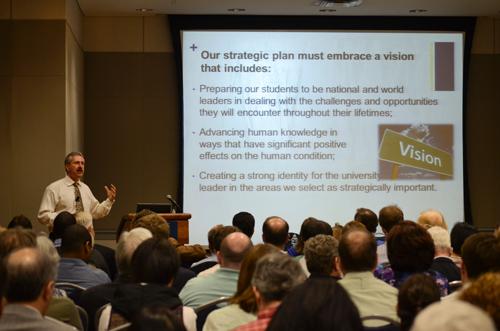
Ideas like creating a GW think tank and merging the University’s schools into one undergraduate college are getting serious attention from the groups laying out this fall’s strategic plan, administrators said at a town hall Tuesday.
More than 200 people – few of them students – attended the event in the Marvin Center, as Provost Steven Lerman and the leaders of the strategic plan’s four working groups presented plans to prepare GW for transformations in the world and in higher education.
The groups have met up more than 30 times since March to discuss the plan’s four themes of globalization, policy and governance, innovation through interdisciplinary collaboration, and citizenship. Each includes about 15 faculty and staff members and two students.
The group focusing on interdisciplinary work has jumped at the idea to create one undergraduate college for students, following the models of Harvard University and the University of Chicago. Uniting undergraduate programs under one college would help students tackle more fields of study instead of staying in one discipline, said the group’s leader, Brian Richmond.
“We need to change the way we think about education,” Richmond, who is also chair of the anthropology department, said. “This would remove barriers that do exist.”
The University could also look toward restructuring undergraduate curriculum to focus on issues like poverty and obesity, or creating more specific minors in subjects like sustainability.
The strategic plan, a signature piece of University President Steven Knapp’s agenda, will look to define GW’s next 10 years. Lerman said the working groups hope to prepare the strategic plan for October’s Faculty Assembly and Board of Trustees meeting.
Senior Vice Provost for Academic Affairs and Planning Forrest Maltzman, who presented plans for the group on policy and governance, said a GW think tank could help expand the University’s research footprint.
He said hiring more tenure-track faculty in policy areas like race relations and sustainability would help strengthen ties between students and policy makers. These relationships would lead to better internships for students, which he said “are not always very meaningful opportunities” because they require mail sorting instead of practical experiences.
“When we turn on the news, we see GW professors and commenting on it but we don’t necessarily see us as the people making it. We want to be seen as the ones making it,” Maltzman said.
GW School of Business Dean Doug Guthrie pitched the University’s international plans, which include broad goals like building “deep relationships” in China, India, Brazil and sub-Saharan Africa.
He said the group discussed doubling the number of international students at GW and continued talks about creating an undergraduate degree program that could span three continents, which Guthrie and Columbian College of Arts and Sciences Dean Peg Barratt will try to launch by fall 2013.
Terri Reed, vice provost for diversity and inclusion, also discussed her groups’ efforts to spearhead changes to how the University develops “model citizens.”
She said creating a first-year undergraduate course on leadership and generating opportunities for a gap semester or year for students to participate in service projects were all on the table for the strategic plan.




